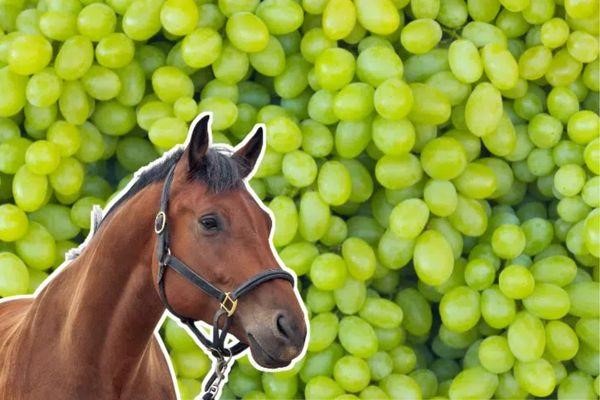Can Horses Eat Grapes? – The shortest answer is YES. Horses can have grapes. As horse owners, ensuring the well-being of our equine companions is a top priority. You must know how to do it safely, and benefits and drawbacks before feeding your horse new food, including fruits like grapes.
In this comprehensive guide, we will delve into the nutritional composition of grapes, explore their potential health benefits for horses, and provide essential considerations when incorporating them into your horse’s diet.
Contents
Can Horses Eat Grapes?
Including fresh grapes in your horse’s diet can be a beneficial addition if done sparingly. When given in moderation, grapes can contribute to a well-rounded and healthy diet for your riding companion. However, like most fruits, there are some exceptions and considerations that horse owners should be aware of. https://hearttohorses.com
Nutritional Composition of Grapes
Grapes are rich in vitamins and minerals that offer tremendous benefits for horses. Unsurprisingly, these nutritious treats are a favorite among horses, thanks to their natural sugar content and delightful sweetness.
The nutritional substances of 100 grams of grapes comprise:
- Carbs: 18 g
- Dietary fiber: 0.9 g
- Fat: 0.16 g
- Protein: 0.72 g
- Sugar: 15.48 g
- Vitamin A: 5 mcg
- Vitamin C: 4 mcg
- Vitamin K: 14.6 mcg
The Health Benefits of Grapes
Although some pet owners are cautious about feeding grapes, they can provide many health benefits for horses. Here are some of the key benefits:
Hydration
Grapes are mostly water (about 82%), making them an excellent choice for additional hydration. While they help with hydration, they should not replace water, and fresh, clean water should always be available to your horse.
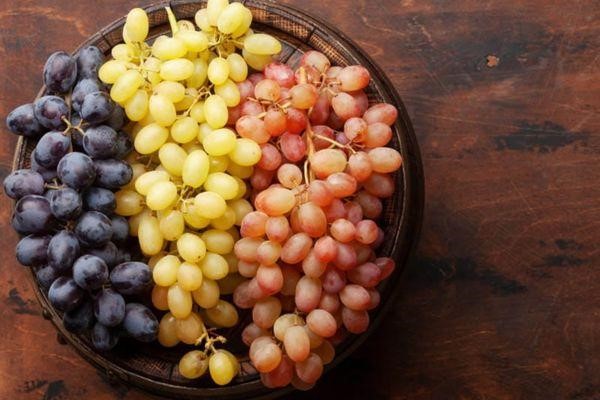
Energy
Grapes are naturally sweet due to their sugar content. While you should limit the amount given, they can provide an energy boost for your horse. This can be particularly beneficial during training or other active periods.
Fibre
Grapes contain fiber, which helps support digestion. Though a few grapes won’t completely transform your horse’s digestive health, they can still aid in maintaining a healthy gut. https://hearttohorses.com
Nutrients
The vitamin C in grapes supports your horse’s immune system, contributing to overall health and wellness.
Antioxidants
Antioxidants play a crucial role in reducing inflammation and detoxifying your horse’s body by eliminating harmful toxins. Over time, toxins can accumulate, especially in horses engaged in rigorous training. For owners of highly active horses, incorporating grapes into their diet can assist in periodically cleansing their bodies from accumulated toxins.
You need to remember that your horse can only safely eat a few grapes at a time, so don’t overdo this delicious spicy fruit.
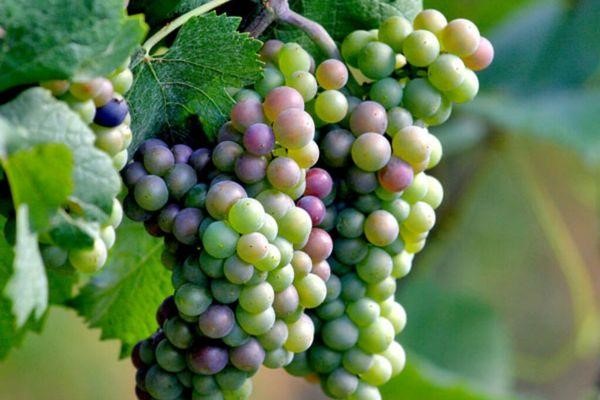
How to Feed Grapes for Your Horse Properly
To feed grapes safely, limit the number to around 10-20 grapes per week, spread out over several days. Start with one or two grapes and observe how your horse reacts before gradually increasing the amount.
If your horse consumes other fruits, it’s best to keep the grape intake to 5-10 per week. Too many grapes can lead to an imbalance in their diet, especially due to their sugar content.
Always wash grapes thoroughly to remove any pesticides or harmful chemicals.
It’s also important to always have hay and fresh water available to your horse, alongside any treats you offer.
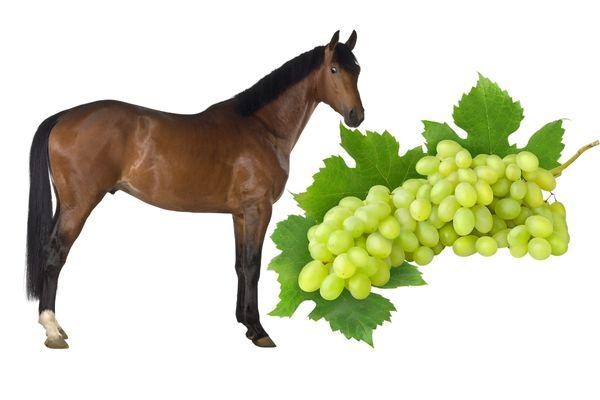
Avoid Feeding Grapes to These Horses…
Insulin-resistant horses should absolutely not eat grapes, including raisins. The reason is because grapes have a high sugar content, which has the effect of increasing blood sugar levels.
A healthy horse may also experience a small increase in blood sugar when they eat too many grapes, but diabetic horses will have more severe reactions. In these cases, you should feed them low-sugar fruits.
Although not a common condition, some horses may be allergic to grapes. Therefore, if you notice any unusual reactions after feeding grapes to your horse, you should consult a veterinarian immediately for timely treatment and treatment.
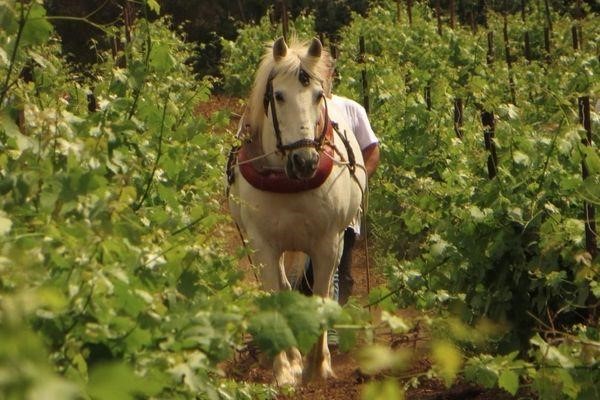
FAQs: Can Horses Eat Grapes?
Can Horses Have Raisins?
Raisins are dried grapes while some horse owners feed them in moderation, it’s crucial to be aware of the concentrated sugar content. Monitor for any adverse reactions.
Can Horses Eat Frozen Grapes?
Frozen grapes can be a refreshing treat, but ensure they are thawed before feeding to prevent potential dental issues.
Are Grapes Good for Horses?
In moderation, grapes can provide hydration, energy, and essential nutrients, making them a beneficial addition to a horse’s diet.
Should Horses Eat Bread?
Bread is not harmful in small quantities, but it’s not a nutritionally ideal treat. Monitor for any adverse reactions.
Can Horses Eat Oranges?
Oranges are safe in moderation, but their high acidity may not suit every horse. Introduce gradually and observe.
Can Horses Eat Bananas?
Bananas are safe in moderation and can be a source of potassium, but be mindful of the sugar content.
Can Horses Eat Pears?
Pears are generally safe and can provide vitamins, but like grapes, feed in a suitable amount.
Can Horses Eat Cucumbers?
Cucumbers are safe and hydrating, making them a refreshing treat for horses.
Can Horses Eat Pineapple?
Pineapple is safe in moderation, offering natural sugars and beneficial nutrients.
Final Thought
Can Horses Eat Grapes? Yes! Grapes can be a healthy and enjoyable addition to your horse’s diet when fed in moderation. Always consider your horse’s individual health needs and consult a veterinarian for personalized advice on their diet. A thoughtful approach to nutrition will ensure your equine companion remains happy and healthy.

